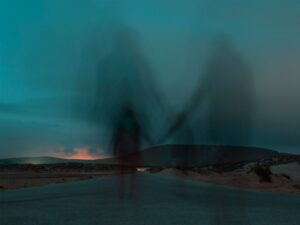Is there such a thing as a true understanding of the world? I don’t mean it as a meta level comment of the ‘what is reality’ variety. Simpler. Let’s assume that reality is our experience of experiencing (or living), nothing more. Not all life events are created equal. The vast majority occur and end without us even noticing. Of the events we do process, most of those are fairly practical and adequately fielded by our active consciousness with its patterns and heuristics. But every now and then, something happens that we notice, but it doesn’t quite fit the mold of what we’ve seen before or how we tend to think about stuff, so we can’t just shove it into a mental box. We’d like to take the easy way out, but we are forced to pay attention. These are the sorts of moments I’m especially curious about right now. There are life events, life happenings, that really touch us, let’s call them Special Moments. It’s like their power comes from the impression that despite our eyes always being open, it was not until now that we saw the truth and understood. I think these moments tend to be but don’t have to be accompanied by an emotional and even physiological (like goosebumps) reaction.
These Special Moments leave me in awe that we live in such a beautiful (or cruel) universe – depending on the flavor of the experience. Sometimes, it’s neither beautiful nor cruel, it’s just totally disinterested and that can be pretty striking, too. It’s like you’re in the peak mode of being human, a sort of peek from the outside in. When we look from the inside out we can go on wondering why this and that happens -> what do I need to do to complete this goal, who is that person, which way is my next appointment, but when we look from the outside in what we get is a glimpse of what is actually there, humans being humans, animals being animals, the world being the world. Following that comment, one could say well being human is not that special then since it’s not much different than animals being animals or the world being the world. But it’s night and day, because as far as we know our ability to abstract and see ourselves in that context is unique. That’s why I say peak mode. It’s not about what life means or what it means to live, it’s about our ability to observe life.
Given a Special Moment though, I don’t know how to share it. A father that puts his hand on his son’s shoulder, a face that says the last thing holding me together just crumbled, waves crashing against a cliff, the stillness of an early morning, a close look at an ant crawling over some dirt. I can say what the moment was, and I may try to say what made the moment special, yet still fail to share the Specialness. Why do I want to share? Because I am human. Humans are social, our existence doesn’t revolve around people, it’s tethered by people (a network with no edges is just a bunch of lonely dots). Quote unquote -> people are the most important thing in life. I also want to share because we humans crave meaning, and we will create meaning out of everything we get our hands on. In comes the Special Moment, the holy grail. Here is this event I experienced that amazed me, and because I need meaning I will flip the order and say here is this amazing event or moment that I experienced. And because people are so important, I want to share this ‘amazing moment’ with them. It makes sense. Of all the things we can share and communicate with each other, naturally we gravitate to the Special Moment. I am not being nihilistic, actually the opposite, I personally encourage wanting to share these Special Moments if for nothing else than they tend to be novel and more interesting (by definition) than the day to day stuff we don’t need to think much about (think the hey how was your weekend, did you check out that new restaurant type questions). Admittedly, there’s a time and place for those thoughtless questions, too.
So we have established why we want to share Special Moments. Let’s address two more questions before circling back to the opener of there being a true understanding of the world or not. (1) Can we share Special Moments accurately and (2) are Special Moments actually special? For both, I claim no answer other than beauty is in the eye of the beholder (depends how you see it). We’ll start with the first one as it’s related to the opening question even though a bit out of order (it assumes a true understanding exists, because why ask if we can express what doesn’t exist, obviously we can’t). My short answer is no. We can’t share Special Moments in their entirety, they are uniquely sensitive to who we were up to when that moment happened, how we experienced the moment, the peripheral factors that mattered but we didn’t notice, etc., etc.. Maybe it depends how you share. With words I feel very skeptical. I can’t put into words for myself what I felt in a Special Moment, so giving that haphazard jumble of words to another, I shouldn’t be surprised if they don’t get it. Even if I were to get the perfect words, in English for example, certainly the perfection would get lost in translation to any other language (there are nuances of expression specific to / perhaps limited intrinsically by the structure of various languages, but I’m not sure, I am not a linguist). A true translation would make us all feel the same, not just similar – is there a method of perception or communication that would allow us to see the human perspective in its most general form? It’s probably not words, what about pictures or video? Still no. Ever show a meme or really cool video to a friend only to have them politely chuckle or nod because there’s nothing special there for them. All that being said, let’s remember the 80/20 rule. I don’t think we can share Special Moments perfectly, but I think with a careful mix of words, sounds, sights, etc. we should be able to create lasting impressions on shared themes among many people -> think critically acclaimed films and novels. Not all people suck. More optimistically, some people take the time to think deeply about what they want to share and it is close enough.
Question 2: Are Special Moments actually special? Again, my short answer is no. I think we all share the same experience set. By experience set I mean all the possible reactions to things that happen in life. X happens, I think or feel Y -> all the Ys together are the experience set. For example, X can be that someone I respect insulted me so I feel shocked and hurt (a Y). There is no emotion or perception that is truly unique and special to any of our lives. Birth, death, heartbreak, love, fear, betrayal, loyalty. They’ve all been lived before as Ys, and I’ll softly add that they’ve all been lived in any of their possible permutations (without getting into my mini theory for the time being). The punchline: a life up to a certain point can be described as a long sequence of specific experiences (a specific sequence of Ys). The question then to determine if you are a special exemption is the same as asking has your specific chain already happened at some point in history for some person? Mathematically, it would just be very very very unlikely that what you have lived is truly unique – practically it’s certainly not, especially if we limit ourselves to life chapters or significant groups of moments vs. comparing entire lives. Not only have all experiences been lived before, they are the same ones that are going to continue to be lived forever regardless of how technology and the future world look – the base level of experiencing humanity will not change. It’s a bit circular, but if our experience does fundamentally change due to some super evolution of the brain / our biological infrastructure (or enhancement with computers), I think it’s a fair argument we are no longer human but something new. Again, to put the positive spin, I claim the Ys are finite, but the Xs are not. Time moves on, things change, the world today is not the same as the world yesterday, so we are constantly facing new and unique ‘actualized’ challenges in that sense. Therefore, although the outcome of our experience is bounded, each day is still a magnificent adventure, and I’ll say that part of the Special Moment, every moment actually, can deservedly be called special.
Now, back to the beginning. The original question. Is there such a thing as a true understanding of the world? Technically, it is a yes or no question, but it’s a bad question. Why? Well what is understanding? Understanding is active. We understand, us humans that rationalize, the world does not understand. Then it hit me, understanding implies meaning. We can only understand that which has meaning, so to ask about understanding the world is to ask about the meaning of the world, and we already know that question is a deep can of worms. What is the meaning of the world? Who knows. But that’s not the point, the point is it’s a bad question. The universe just is, and it is we who create meaning by rationalizing, so it’s apples and oranges to ask if a man-centric, yet real, thing like meaning can be forcibly overlaid onto it. Understanding and meaning are interlinked with humanity and perhaps do not exist without humanity – they may have come to life at the same time. Not the conclusion I thought this would lead to. Still, this is interesting because again we encounter this duality of human life – the universe is and we can suppose it’s impartial at the same time, which may have depressing conclusions depending how you think, but in the face of such gloomy potential we look at the other side of the coin where the impartial stuff that happens is very much not impartial if we choose to see it not how it is but what it is in the context of our lives.




Hello!
Good cheer to all on this beautiful day!!!!!
Good luck 🙂